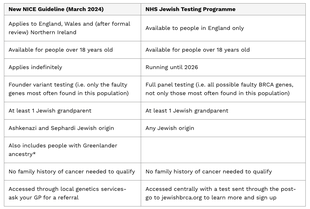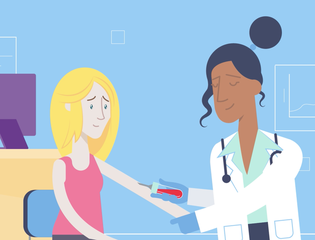Why are some populations more likely to carry faulty BRCA1/2 genes?
We know from decades of research that people of Jewish ancestry are more likely to carry faulty BRCA1 and BRCA2 genes, and the recent NICE guideline also states that people of Greenland descent are also at a higher risk, but why is this?
Our Special Projects Manager Jo Stanford takes a deep dive into the topic.
In this article you'll find the following;
- What populations are at risk
- The impact of BRCA faults
- What does ancestry mean?
- What is the eligibility criteria for genetic testing?
What populations are at higher risk of carrying a faulty BRCA1/2 gene?
Research tells us that people with Ashkenazi Jewish heritage have a 1 in 40 chance of carrying a faulty BRCA gene, compared to 1 in 200 of the general population. This means out of every 40 people with Ashkenazi Jewish heritage, one will carry a faulty gene. Sephardi Jews are thought to have a 1 in 140 chance.
People with ancestry from Greenland have also been found to be more likely to carry BRCA1 gene faults, though the exact proportion that are affected is not quite as clear (it’s thought to be between 1.1% and 11.64%).
Founder variants have been identified in other populations, including Polish and Icelandic, however they are not as common as in the populations listed above.
More recently, a BRCA1 gene fault was identified that is linked to Orkney in Scotland, however further research is needed to learn more about this, though it’s not thought to be as common as in the Jewish population.
What is the impact of BRCA gene faults in these populations?
These gene faults result in significantly increased risks of cancer, including breast and ovarian cancer in females, breast and prostate cancer in males (for BRCA2), and pancreatic cancer for all carriers.
Once a person knows about their increased risk, there are options such as increased screening options and risk-reducing surgery available, however it’s estimated that 95% of carriers have no idea they are at risk.
You can read more about BRCA gene faults and their impact on our Hereditary Hub.
What do we mean when we talk about ancestry?
Ancestry and heritage refer to your family background and where members of your family tree lived or came from.
In terms of the Jewish population, the different types of ancestry refer to where in the world that group originated from. Having Jewish heritage doesn’t mean you personally observe Judaism as a religion, but that some of your relatives in your family tree did, so anyone with Jewish ancestry should take note.
We also know that there are many people who are unaware they have Jewish heritage in their family tree, but they are still at risk of carrying a faulty BRCA gene.
Why are people with certain ancestry more likely to carry these gene faults?
The types of gene faults found more commonly in these populations are due to something called the “founder effect”, which is seen in genetics in general, not only related to cancer risk. It is thought to occur when genetic changes happen in small communities that have been isolated for various reasons (including culturally or geographically).
For example, over 90% of the BRCA gene faults found in the Jewish community are one of three “founder mutations”.
Researchers have tried to trace the origins of these specific faults found in these populations. One theory is that the original faults occurred around the time of a genetic “bottleneck” around 600-800 years ago as a result of persecution, plagues and isolation, where the population reduced down to as few as 350 people1 .
This resulted in a decrease in genetic diversity, but later was followed by a large expansion in the population. After moving geographically over many hundreds of years, we now see these particular gene faults in the Jewish population across the world today.
Ashkenazi Jews are the largest group, making up 80% of all Jews in the world and have roots in Central or Eastern Europe. Other Jewish groups include Sephardi Jews, originating from the Iberian Peninsula (Spain and Portugal), and Mizrahi Jews, who come from Middle Eastern ancestry.
Why would I get tested if no one in my family has had cancer?
Although it’s one of the main ways we have of judging inherited risk, using a person’s family history of cancer to work out whether they are likely to carry a high-risk faulty gene is actually not that accurate, because around 50% of people with a faulty BRCA gene don’t have a family history of cancer.
You can read some of the reasons why in our blog post on this topic here.
How would I know if I have certain ancestry?
This is an important question. To access testing based on having the ancestry listed, you only have to have one or more grandparent that was part of that population.
One way to find this out is to look into your family tree, talk to your relatives about where they and their family lived, and write down what you learn. This can actually be a good chance to tell stories, remember people who have passed away, and write down other useful health information.
Through this process you may well find out you have a family history of certain health conditions you weren’t aware of, which will help you in the future.
It’s important to note that when we talk about Jewish ancestry, we don’t mean that you practice the religion itself, but rather that your ancestors did.
How do I get tested if I think I qualify?
If you have one Jewish grandparent, you have two options to access BRCA testing, depending on your situation.
You can sign up through the NHS Jewish BRCA Testing programme, or you can be tested through the NHS with your local genetics service.
You can read the eligibility criteria and how to access testing below:
What is the testing eligibility criteria?

Eligibility criteria for genetic testing according to NICE guidelines as of March 2024.
To read more about the new NICE guideline, read our blog post here.


